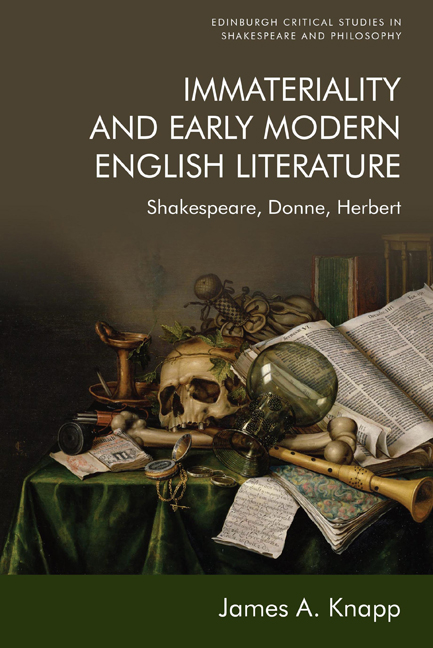3 - ‘For I must nothing be’: Richard II and the Immateriality of Self
Published online by Cambridge University Press: 10 October 2020
Summary
Just after his deposition in Richard II, Shakespeare's ‘poet king’ famously calls for a mirror in perhaps his most performative gesture of the play. When Bolingbroke humours him by having an attendant produce the glass, Richard laments that the image offered in the mirror fails to reflect the depth of his sorrow:
Hath sorrow struck
So many blows upon this face of mine
And made no deeper wounds? (4.1.270–2)
In apparent disgust at its failure to register his grief, Richard casts the mirror down, dramatically re-enacting the deposition itself – his divine authority represented in the majestic image, ‘the pompous body’ of the king ‘cracked in an hundred shivers’ (4.1.243, 282). Unfazed, the usurping Bolingbroke belittles the ‘moral’ of Richard's high drama – ‘see how quickly my sorrow hath destroyed my face’ – with his observation that in breaking the glass Richard has only played with appearances: ‘The shadow of your sorrow hath destroyed / The shadow of your face’ (4.1.285–6).
In Richard's response, Shakespeare offers what appears to be a characteristic gesture towards interiority, inward self-reflection. The newly deposed king – the simply mortal Richard – agrees with Henry, ‘the silent king’, that the face reflected in the mirror
And these external manner of laments
Are merely shadows to the unseen grief
That swells with silence in the tortured soul. (4.1.289–91)
The use of analogy – ‘shadows to’ – rather than empirical description – ‘shadows of’ – emphasises the immaterial nature of Richard's ‘unseen’ grief. But Richard's insistence that his ‘grief lies all within’ confuses the use of analogy with a material metaphor, begging the question: within where? It is tempting to identify in Richard's lines evidence of a modern form of subjectivity, one that anticipates a Cartesian dualism in which the extended body and non-extended mind have different modes of existence. But the form of his analogy makes things more complicated: his external laments are to his ‘unseen grief’ as shadows are to material things. The analogy places special pressure on the material: material things block light to cause shadows, and though shadows have no substance, they indicate an unseen material substance presumably accessible to sense from another perspective (e.g. when not looking at the shadow but at the object producing it).
- Type
- Chapter
- Information
- Immateriality and Early Modern English LiteratureShakespeare, Donne, Herbert, pp. 89 - 123Publisher: Edinburgh University PressPrint publication year: 2020



